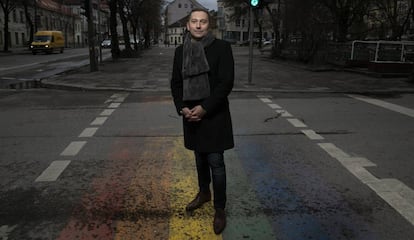The long journey out of the closet for Lithuania’s gay community
After decades of repression under the Soviet Union, the LGBT+ community in the Baltic state feels that it is finally becoming more accepted, but knows there is still work to be done


On August 10, 2018, 55-year-old Vladimir Simonko had just got on a plane in Frankfurt, Germany to return home to Vilnius, the capital of Lithuania, where his boyfriend Eduardas Platovas, also 55, was waiting for him. The plane had WiFi, so Simonko – who was returning from a business trip to Canada – connected to the network. “You should never do that,” he warns now from his office in the center of Vilnius. As soon as Simonko was online, his partner called him via Skype. “We’re being attacked,” he told him. And Simonko was left, at 10,000 meters of altitude, in a “complete state of shock.”
At 4am on that day in August, a group of hooded figures, who are yet to be identified, hurled Molotov cocktails against the small office belonging to the Lithuanian Gay League (LGL), which is the first organization in Lithuania to fight for LGBT+ rights. Simonko founded the organization in 1995, two years after the country decriminalized homosexuality. Fifteen minutes later, another Molotov cocktail was left outside the house of the couple, who work to bring visibility to the gay community in one of the most restrictive countries in the European Union when it comes to homosexuality. Only 24% of Lithuanians support same-sex marriage compared to the European average of 64%, according to a 2016 survey by the European Commission.
Some people put attacks such as that against the LGL down to pure homophobia, while others argue that it is more to do with the fact that until recently, the country was under the control of the Soviet Union. To adapt to something new, to something different and to literally open up, “takes time,” says Vytis Jurkonis, project director of the Lithuanian branch of an NGO called Freedom House. “Despite the magnificent progress in recent years, the LGBT community is still facing habitual discrimination,” explains Daniele Viotti, a member of the European Parliament who is on the civil liberties commission, via email.
The USSR considered homosexuality an undesirable decadence of the bourgeoisie Daniele Viotti, MEP on the civil liberties commission
When it comes to discrimination, the Baltic Republic comes 37th out of 49 European countries in the ranking of the International Lesbian, Gay, Bisexual, Trans and Intersex Association (ILGA), with family values being the main obstacle to the advancement of LGBT+ rights.
When the country, which has almost three million inhabitants, lived under the Soviet Union, everyone needed to be equal, says Viotti. “The USSR considered homosexuality an undesirable decadence of the bourgeoisie,” he explains. What’s more, homosexuality wasn’t even considered to exist and was believed to be a notion that “came from Western thought,” says Simonko. However, since the dissolution of the Soviet bloc in 1991 – Lithuania was the first of the 15 Soviet Republics to recover its sovereignty – and the subsequent accession to the European Union in 2004, the country has slowly been giving more public space to the LGBT+ community. However, this is mainly the case in Vilnius, which has hosted various pride festivals, including this year’s Baltic Pride which will take place in the spring.
The EU is the best thing that’s happened to Lithuania, not only in economic terms but also legal ones Mark Adam Harold, a British councilor at Vilnius City Hall
“The EU is the best thing that’s happened to Lithuania, not only in economic terms but also legal ones,” says Mark Adam Harold, a British councilor in Vilnius City Hall who despite being straigh, fights for LGTB+ rights. The European Parliament, which has funded this feature article, “has taken action so that the rights of the LGBT community are respected and it has asked member states to approve anti-discriminatory laws,” explains Viotti. However, there is still much that needs to be done because “LGBT people continue to be the object of discrimination and victims of hate with more frequency,” said recently Vera Jourová, the European Commissioner for Justice, Consumers and Gender Equality.
Sources from the Lithuanian government admit, however, that what is starting to be seen in Lithuania is “tolerance, but not coexistence” for the LGTB+ community. Jurkonis, an activist and expert in human rights, is optimistic when it comes to this slow path but is sure that Lithuanian society has chosen to accept the LGTB+ community. In fact, he believes that the country is not in such a bad situation considering its geographical and historical context. “Belorussian gays come to Lithuania so they can freely go out!” he exclaims, pointing out that the Balkan republic conceded asylum to homosexuals from Chechnya in 2017.
A new generation
While breaking with the country’s communist past was certainly a breath of fresh air for the LGBT+ community, accession to the European Union gave rise to fresh hope for members such as Simonko, who had felt oppressed because of his sexual orientation. Simonko discovered his sexuality at 25, while he was studying in Russia. “It was very late,” he says, standing above a pride flag painted on a crosswalk with help from volunteers. “When we have more money, I’ll paint more,” he explains. In Vilnius, where there is only one nightclub for the gay community – SOHO, which opens on Fridays and Saturdays – homosexual symbols are notable for their absence.
Tomas V. Raskevicius represents the new generation of gays in Lithuania and is Vilnius’s first openly gay politician
Tomas V. Raskevicius represents the new generation of gays in Lithuania who want to “come out of the closet” without fear of their parent’s opinions – one of the biggest problems for a generation that grew up under communism, where homosexuality was prohibited. “I am a professional gay,” he says with a smile in Vilnius City Hall, a large glass skyscraper which looks over the Baltic city. He is the first openly gay politician at Vilnius City Hall.
Raskevicius, who is wearing a long quilted coat and a floral shirt, and is a shaved head and blue contact lenses, was Vilnius’s first openly gay politician whose electoral campaign not only drew upon his personal history, but also on the defense of LGBT+ rights. During the campaign, Raskevicius recalls how he was harshly criticized by politicians and by society for “not knowing how to be anything other than being gay.” He explains how that showed him that there is a “double standard” for members of the LGTB+ community. “We always have to be better, more competent and more knowledgeable. But we’ve already broken the glass ceiling,” he concludes.
“Things are moving along much quicker than anyone could imagine,” explains city councilor Harold from his seat in the municipal chamber. He sums up his vision of the LGTB+ community during the last 15 years, the time during which he has resided in the country. “The first Pride was violent. There were a lot of protests, including aggressions on the part of a number of politicians.” During the second, just six eggs were thrown in protest, “which was progress!” he jokes. “And the last one, which took place three years ago, was the celebration and festival that we all dreamed of. We have won the battle, this is no longer a fight.”
Lithuania and LGBT
Homosexuality was decriminalized in 1993.
Same-sex marriage is illegal.
Adoption by gay parents is illegal.
To change gender, a court ruling is required and only after surgery has taken place. The process is nonetheless very complicated.
The first Pride festival was in 2010.
English version by Asia London Palomba.